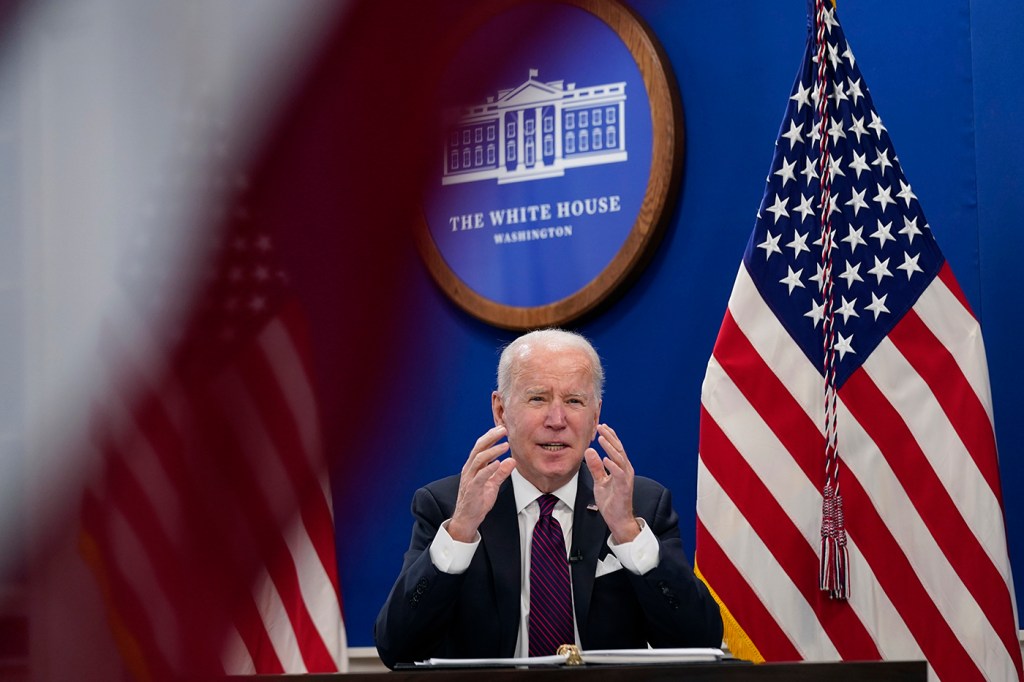Can Biden cancel student loans?

It’s been more than a year since President Joe Biden took office and he still has not followed through on a major campaign promise: Tackling the student-loan crisis.
When asked about the issue during a two-hour-long press conference on Wednesday, Biden dodged the question. The reporter asked if Biden would act on a plan he outlined during his campaign that included at least $10,000 of outright debt cancellation per student.
The president has not been totally mute on the matter, instead maintaining that it is up to Congress to act. Biden still supports cancellation. Earlier this month his administration extended a pandemic federal loan payment freeze for roughly 41 million borrowers until May 1. But critics say the measure falls far short of dealing with the roughly $1.7 trillion debt burden that has been a drag on the economy, hindering a generation of Americans from purchasing homes and starting families. Congress also has declined to take up the matter, punting the issue back to the White House.
So, can the president, using his executive authority, cancel student-loan debt?

Thomas J. Vicino, associate dean of graduate studies and professor of political science, public policy and urban affairs at Northeastern, poses for a portrait. Photo by Alyssa Stone/Northeastern University
“It depends,” says Thomas J. Vicino, associate dean of graduate studies and professor of political science, public policy and urban affairs at Northeastern. “It’s an open legal question. The president’s executive power is generally quite broad, and obviously some Democrats have said, yes, he does have the power.”
It’s not clear how canceling the debt would work, Vicino adds. It’s unclear, for example, whether cancellation means that the banks disbursing the loans would be repaid, with the government—and, therefore, taxpayers—footing the bill, or if the debt can simply be erased. Democratic lawmakers have insisted that Biden has the authority to wipe out the debt, urging the president to do so for amounts up to $50,000 per person.
Borrowers and advocates of debt forgiveness have been vocal with calls for the president to follow through on his promise. Biden’s hesitation only underscores how sticky the topic has become politically amid the divisions within his own party on a number of his administration’s legislative priorities, which is coming during a pivotal election year that could see the Democrats lose their narrow majorities, Vicino says.
“Whether the president does or does not have the power is an important legal question, but the political question of whether he should use that power is what’s at play here,” Vicino says.
Of course, the issue of the burgeoning debt will not be going away. Vicino says that it has been a crisis-in-the-making for years, one that parallels the housing crash of 2008 in scale. Like the housing crash, mounting student-loan debt, sometimes from predatory lenders, disproportionately hurts people of color and other marginalized populations. The COVID-19 pandemic, which has brought economy-wide disruptions, has only made matters worse.
“There is an economic imperative to act,” Vicino says.
“Right now, student-loan debt is so large that it’s basically made achieving the middle-class American Dream impossible,” he says. “It’s put home ownership out of reach because the costs involved in purchasing a home and having children at the moment are astronomical. For most people under 40, those decisions are being put off and delayed because of student-loan debt.”
The ongoing payment freeze has been saving borrowers some $5 billion a month, according to the U.S. Department of Education. The vast majority of borrowers have taken out federal loans through the government’s student-aid program, with only 8% pursuing private options.
Biden has asked the U.S. Department of Justice to review his powers for forgiving the debt. The review is ongoing.
For media inquiries, please contact media@northeastern.edu.






